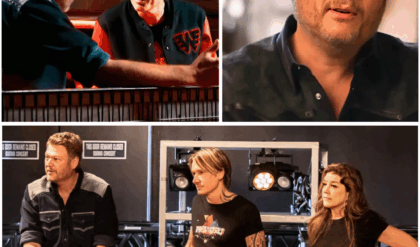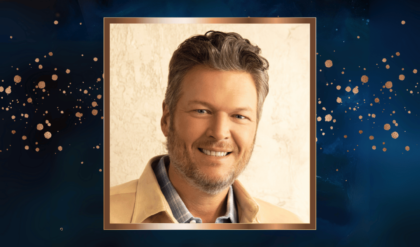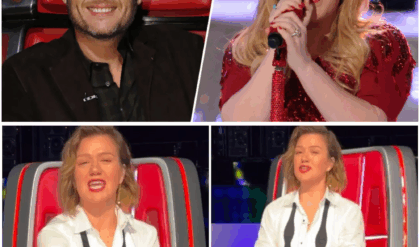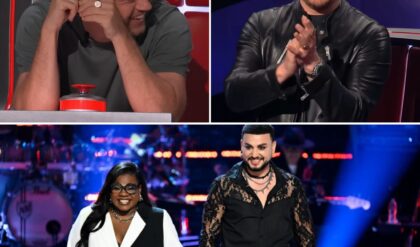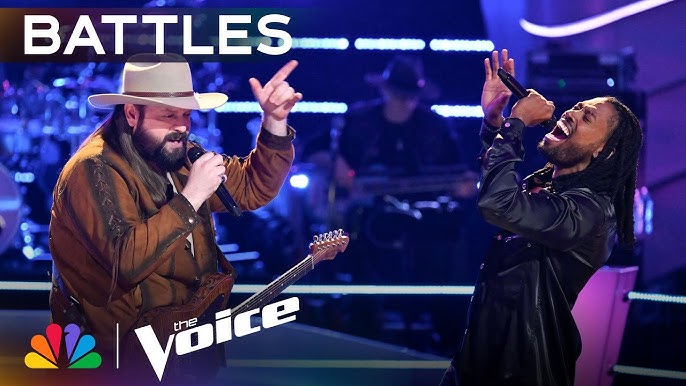
Picture this: the stage lights of NBC’s The Voice dim to a brooding crimson, casting long shadows across a sea of polished wood and coiled cables, the air thick with the electric hum of anticipation that only a Knockouts round can summon—like the moment before a storm breaks over the open plains, where the wind whispers secrets of thunder yet to come. Into that charged silence strides Aaron Nichols, a 32-year-old cowboy from Bakersfield, California, his boots scuffed from years of honky-tonk hustles and his eyes carrying the quiet fire of a man who’s sung through more heartbreaks than he’d care to count. He grips the microphone not as a lifeline, but as a weapon, launching into a cover of “Hurricane” by The Band of Heathens that doesn’t just perform—it erupts, a raw, gravel-laced torrent of rock-infused country that rips through the studio like a twister tearing shingles from a barn roof. The coaches—Reba McEntire, Michael Bublé, Snoop Dogg, and Niall Horan—lean forward in unison, their red chairs creaking under the weight of stunned reverence, but it’s McEntire, the Queen of Country herself, whose hand hovers over a gleaming new button: the Mic Drop, a brand-new power in Season 28 that catapults one artist toward a shot at performing on the Rose Parade stage come New Year’s Day. In that heartbeat, as Nichols’ voice cracks with the kind of soul-deep grit that turns notes into confessions, McEntire doesn’t hesitate. She slams the button, the arena erupts, and in an instant, Aaron Nichols isn’t just advancing—he’s ascending, his “Hurricane” not merely a song, but the gale-force catalyst that could redefine his destiny and remind us all why The Voice remains television’s most intoxicating alchemy of vulnerability and virtuosity.
It was Monday night, November 17, 2025, during the high-stakes frenzy of The Voice Season 28’s Knockouts Part 4, and the episode had already crackled with the kind of drama that hooks you from the opening montage: mega-mentors Joe Walsh and Zac Brown barking wisdom in rehearsal rooms thick with sweat and second-guessing, artists trading blows in head-to-head battles where no steals or saves soften the sting of elimination, and the specter of the Mic Drop looming like a golden ticket in a world of velvet ropes. For Team Reba, the matchup was a clash of country titans: Nichols, the weathered troubadour with a voice like aged bourbon, pitted against Cori Kennedy, a powerhouse belter whose rendition of Lady Gaga’s “You and I” unfurled with the ferocity of a dust devil, her full-bodied delivery drawing gasps and Stevie Nicks comparisons from Horan himself. “You walk out and you just destroy,” Bublé marveled, his jazz-polished poise cracking under the sheer force of her stage command. Snoop Dogg nodded along, his laid-back drawl cutting through: “You started off mild, then got real hot—like a barbecue nobody saw coming.” But when Nichols took the stage, flipping the script with “Hurricane,” the room shifted. The song, a 2008 roots-rock anthem from The Band of Heathens that pulses with themes of reckless love and stormy redemption—lyrics like “She hit me like a hurricane, left me twisted in the wind”—became, in his hands, a personal manifesto, his rugged tone weaving through the melody with a grit that felt excavated from the oil fields of his hometown, where dreams are drilled deep and disappointments bubble up like crude.
From the first strum of the acoustic guitar—amplified by a band that included a pedal steel wailing like a lonesome coyote—the performance built like a front rolling in from the Sierra Nevada: verses delivered with a low, rumbling menace that evoked the ache of long-haul truckers nursing regrets at dawn diners, exploding into a chorus where Nichols’ voice soared, raw and unfiltered, hitting highs that shattered the studio’s polished veneer and lows that grounded the chaos in earthy truth. Walsh, the Eagles legend turned mega-mentor, had pulled him aside in rehearsals, his grizzled gaze piercing: “I can’t quite see your eyes, Aaron—be more present, let us in.” And Nichols did, emerging from that nudge transformed, his performance a masterclass in emotional excavation, eyes locked on some invisible horizon as if chasing the ghost of every gig that never quite broke him. Bublé, ever the vocal surgeon, envied the texture: “I wish I had that gritty thing that seems to come so easily to you.” Snoop, exhaling a plume of metaphorical smoke, dubbed him a “star whether you win or not,” while Horan leaned in with the fervor of a convert: “If that was on the CMAs, it’d be all over the internet the next day—so powerful, so captivating.” By the final, lingering note—a sustained wail that hung in the air like debris after a funnel cloud—McEntire’s face told the story: eyes wide, hand trembling over the decision, her legendary poise yielding to a moment of pure, unscripted awe.
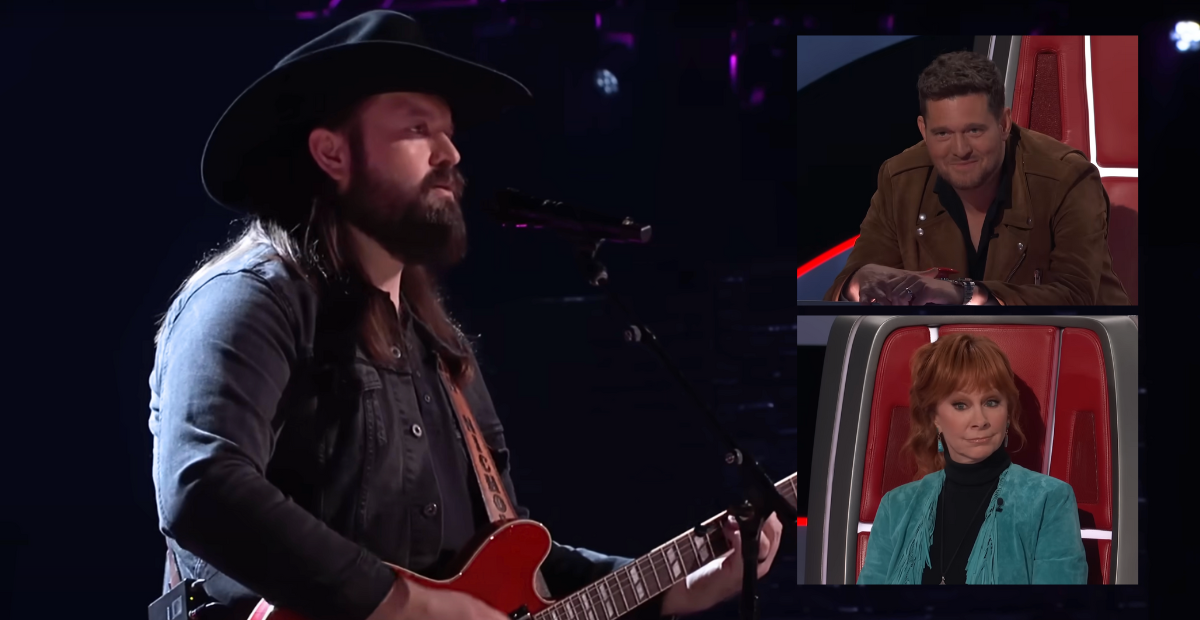
To understand why this performance landed like a lightning strike, one must peel back the layers of Aaron Nichols’ odyssey, a narrative as textured as the calluses on his fretboard, forged in the sun-baked crucible of Bakersfield, that unyielding hub of California’s Central Valley where the air shimmers with heat mirages and the ground yields black gold but precious few shortcuts to stardom. Born on a crisp autumn day in 1993 to a family of oil-field roughnecks—his father a driller who’d lost fingers to the unforgiving bite of machinery, his mother a diner waitress whose lullabies were laced with Merle Haggard harmonies—young Aaron learned early that music wasn’t a luxury, but a lodestar in the fog of fleeting fortunes. The Nichols home was a modest rancher on the outskirts, ringed by pumpjacks nodding like mechanical prayers, where evenings unfolded to the twang of a pawn-shop guitar passed down from an uncle who’d chased Nashville dreams only to wash back up broken. At age eight, Aaron’s fingers first danced across those strings, mimicking the radio’s ghosts—Hank Williams’ lonesome yodels, Buck Owens’ Bakersfield bounce—his small hands blistering as he hammered out chords until the pain blurred into purpose. “Music was the one thing that didn’t leak away like the oil,” he’d later confide in a post-performance interview, his voice still husky from the stage. School was a sideline, hockey and high school football filling the gaps until a knee injury at 16 sidelined him for good, thrusting him deeper into the local scene: open mics at the Crystal Palace, that hallowed haunt where Dwight Yoakam once slung beers between sets, and weekend warrior gigs at county fairs where the pay was gas money and the crowd was half-drunk on Bud Light and half on possibility.
By his early twenties, Nichols had traded the Valley’s dust for Nashville’s glitter-dusted grind, arriving in 2015 with a demo tape clutched like a talisman and a beat-up Ford F-150 that doubled as his crash pad during lean months. Music City welcomed him with open arms and closed doors—a parade of rejection slips from labels chasing the next bro-country flash-in-the-pan, interspersed with bar gigs that paid in tips and tales. He scraped by as a session player, laying down tracks for up-and-comers in Printer’s Alley studios that smelled of stale coffee and fresh ambition, his own originals simmering on the back burner: songs like “Dust Devil Heart,” a self-penned cut about a love that spun him out like a twister, which he’d hawk on Bandcamp for pocket change. A breakthrough flickered in 2018 when he landed a development deal with Big Machine Label Group, co-writing a cut for a mid-tier act that cracked the Top 40, but the label folded amid industry upheavals, leaving him adrift once more. Undeterred, Nichols doubled down on the dive-bar circuit, building a loyal following through sheer sweat equity—nights blurring into a montage of neon signs, spilled pitchers, and encores demanded by crowds who saw in his weathered baritone a mirror to their own hard-won scars. A viral TikTok clip in 2022, him busking “Wagon Wheel” on Lower Broadway with a stray dog at his feet, amassed 2 million views and a manager’s card, but true momentum eluded him until The Voice blind auditions in 2025, where his cover of Chris Stapleton’s “Tennessee Whiskey” turned four chairs, McEntire’s the quickest to spin. “Boy, you’ve got that Valley thunder in your veins,” she drawled, sealing his fate on Team Reba.
Reba McEntire, at 70, remains the North Star of country music’s constellation—a woman whose career spans five decades, 75 million records sold, Broadway triumphs, and a resume etched with Grammy gold and Broadway bows—yet in Season 28, she’s more than a coach; she’s a curator of comebacks, her red chair a confessional for artists like Nichols who’ve tasted the bitterness of near-misses. The daughter of a world-champion steer roper from Chokie, Oklahoma, McEntire’s own ascent was a whirlwind: discovering her voice in the back of her dad’s pickup truck, harmonizing to Hank and Patsy at rodeos before her 1976 Decca debut, then exploding with “Fancy” in 1990, a Merle Haggard cover she flipped into a feminist anthem that still chills spines with its tale of desperate reinvention. Losses tempered her fire—the 1991 plane crash that claimed seven bandmates, a devastation she channeled into the resilient balladry of For My Broken Heart—but McEntire’s gift has always been spotting sparks in the embers, mentoring underdogs on The Voice since Season 24 with a blend of maternal warmth and unyielding candor. “I’ve been where you are, darlin’—knee-deep in the mud, singing to empty rooms,” she told Nichols during rehearsals, her Okie twang wrapping around him like a well-worn denim jacket. Under her wing, he’s shed layers: Walsh urging presence, Brown fine-tuning phrasing, McEntire drilling the intangibles—eye contact that connects, vulnerability that doesn’t bleed into apology. By Knockouts night, the alchemy was complete; “Hurricane” wasn’t just a song—it was Nichols unchained, a performance that fused his Bakersfield roots with McEntire’s polished thunder, every rasp a rebuttal to the years of “almosts.”
The Mic Drop, introduced this season as The Voice‘s boldest twist yet, elevates the stakes beyond the playoffs: one per coach, a nomination for viewer-voted glory at the Tournament of Roses Parade, where 40 million eyeballs will tune in on January 1, 2026, to crown the ultimate showstopper amid floats of flora and football fanfare. It’s a power that demands conviction, a once-per-season Hail Mary that McEntire, with her Mic Drop still holstered after three prior knockouts, unleashed without fanfare—casually pressing the button mid-hug, as if bestowing a family heirloom rather than a high-wire gamble. “Aaron can go the whole way in this competition,” Horan affirmed post-performance, his Irish lilt laced with envy, while backstage, Nichols—sweat-slicked and shell-shocked—pulled McEntire into an embrace that spoke volumes: “She’s the absolute best. All that advice, and then this? It’s like she saw the storm in me before I did.” The moment sliced through social media like a hot knife through butter: #AaronHurricane trended worldwide within minutes, amassing 1.5 million views on the official clip by dawn, fans dissecting every nuance—”That grit at 2:14? Chef’s kiss!”—while memes fused Nichols’ twister with McEntire’s iconic red hair, captioned “When Reba drops the mic and summons the Queen of Country.” Critics hailed it as peak Voice: Billboard dubbing it “the gut-punch of the season,” praising how Nichols’ cover transcended homage, injecting fresh fury into a track that’s long been a bar-band staple. Even Kennedy, eliminated but unbowed, tweeted grace: “Aaron owned that stage—proud to battle beside a brother.”
As the dust settles on this Knockouts cyclone, Nichols stands at a precipice, his path to the semifinals paved with promise and peril: next up, potential battles against Team Reba’s remaining roster—soulful crooner Jamie Miller or firebrand Mindy Rodriguez—before the playoffs, where live votes will decide if his thunder rolls into finals glory. Offstage, he’s a quiet force: engaged to high-school sweetheart Lena since 2022, father to a toddler named Wyatt who FaceTimes nightly with garbled encouragements, Nichols balances the blitz with grounding rituals—morning runs along the Cumberland, songwriting sessions in a rented East Nashville shotgun house where walls are papered with rejection letters turned talismans. “This ain’t about the win,” he told People post-episode, his Bakersfield burr undimmed by the glare. “It’s about the song finding its way out—the one that’s been rattling in my chest since Dad’s old truck radio went silent.” McEntire, ever the oracle, sees the supernova: “You’re perfect for the Rose Parade, Aaron—roots deep as an oak, branches reaching for the sky.”
In a season stacked with cross-genre fireworks—Snoop’s hip-hop infusions clashing with Bublé’s velvet croons, Horan’s pop polish sparring with McEntire’s twang—the Nichols moment emerges as the emotional epicenter, a reminder that The Voice thrives not on spectacle alone, but on stories that storm the soul. As voting opens for the Mic Drop contenders—Nichols alongside Snoop’s pick DEK of Hearts and Horan’s wildcard—America holds the reins, but the real victory? It’s already etched in that split-second button press, where a coach’s faith met an artist’s fury, birthing a “Hurricane” that won’t soon dissipate. Tune in Mondays at 8/7c on NBC; in the meantime, crank up The Band of Heathens, pour a whiskey neat, and let the wind howl. Aaron Nichols isn’t just in the running—he’s rewriting the forecast, one gritty note at a time.
